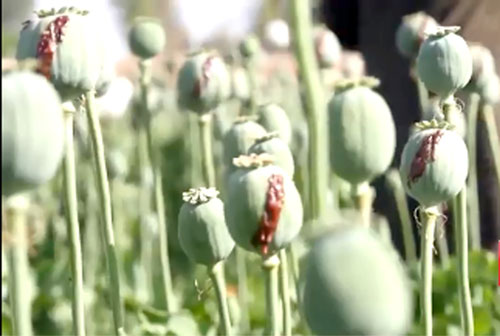Days after the announcement of an overall ban on the cultivation of poppy by the Islamic Emirate, the farmers in the southern provinces — a main supply area — said the price of crops have doubled.
Earlier, the Islamic Emirate’s supreme leader in a decree banned the cultivation of any kind of plants used for narcotics in the country.
The farmers said that the announcement of the ban on poppy cultivation caused a significant spike in the price of the product.
Niaz Mohammad, a farmer in Kandahar province, said that he cultivated poppy plants on 250 acres of land, where dozens of people are working on the farms.
“Until our government stops us from cultivating it, we will not stop cultivating poppy. We don’t care about the westerners,” said Niaz Mohammad, a farmer.
“It is a good business. A lot of people are working on the farms,” said Zarqawi, a worker.
There are children who are working on the farms.
“I collect the opium and then sell it. When I collect a couple of pounds. I take my share and sell it,” said Waras Ahmad, 10, who was working on the poppy farms.
However, the farmers called on the Islamic Emirate to provide them with support.
“There is drought. We have not had good products this year. This is our product. We don’t have anything else to produce,” said Lal Mohammad, a farmer.
Based on the Islamic Emirate’s leader’s decree, the usage and trafficking of drugs and alcohol has been banned across the country.
Many residents of the Shirzad district in the eastern province of Nangarhar are busy growing opium poppy in the Gandamak area, where it was planted months earlier.
Farmers who grow and harvest the opium poppy in the district receive 500 Afs (About $6.40) per day.
“We don’t have money–there is neither work nor school, therefore we came here with our children for work,” said Abdul Haq, a laborer in Shirzad district.
The Taliban had full control over most areas in Shirzad district, said district residents and farmers, adding the Taliban had cultivated the opium poppy while they controlled the district.
The Taliban pressure the landowners in the district to pay them a tax for the cultivation of poppy on their lands, officials said.
“We have to do this–the schools are also shut down due to the war,” said Zubair, a young farmer in the district.
“We carry on our daily life with this work, ” said Khan, another farmer in the Shirzad district. The district was recaptured by Afghan security forces from the Taliban recently, and opium poppy is being cultivated and smuggled in the district, said Zia ul Haq Amarkhel, Nangarhar’s governor, who added that soon the cultivation and trafficking will be halted in the district.
“The Taliban are behind all the smuggling, abductions, destruction, and poppy cultivation,” he added.
Enamullah Saapai, head of Nangarhar’s agriculture office, said there are plans to create dozens of hectares of crops in Hesarak, Khogyani and Shirzad districts this year and, they will contribute seeds for the farmers to grow alternative crops.
In addition to the cultivation of opium, Hashish is also being cultivated in Shirzad, Khogyani and Hesarak districts, said Nangarhar’s local officials.—Tolonews










